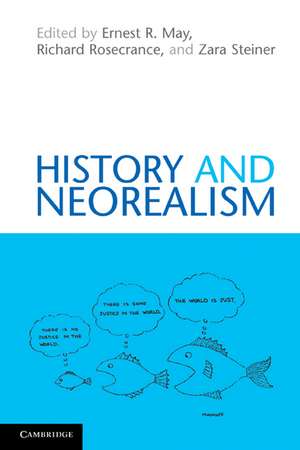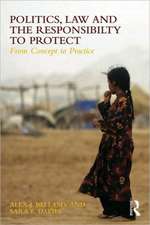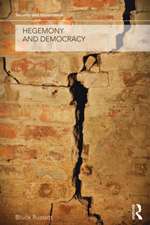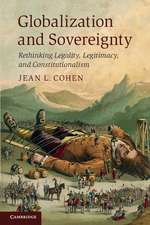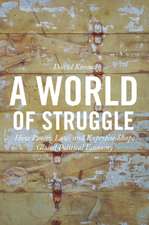History and Neorealism
Editat de Ernest R. May, Richard Rosecrance, Zara Steineren Limba Engleză Paperback – 8 sep 2010
| Toate formatele și edițiile | Preț | Express |
|---|---|---|
| Paperback (1) | 289.49 lei 6-8 săpt. | |
| Cambridge University Press – 8 sep 2010 | 289.49 lei 6-8 săpt. | |
| Hardback (1) | 502.15 lei 6-8 săpt. | |
| Cambridge University Press – 8 sep 2010 | 502.15 lei 6-8 săpt. |
Preț: 289.49 lei
Nou
Puncte Express: 434
Preț estimativ în valută:
55.40€ • 57.63$ • 45.74£
55.40€ • 57.63$ • 45.74£
Carte tipărită la comandă
Livrare economică 12-26 aprilie
Preluare comenzi: 021 569.72.76
Specificații
ISBN-13: 9780521132244
ISBN-10: 052113224X
Pagini: 406
Ilustrații: 6 tables
Dimensiuni: 153 x 229 x 20 mm
Greutate: 0.64 kg
Editura: Cambridge University Press
Colecția Cambridge University Press
Locul publicării:Cambridge, United Kingdom
ISBN-10: 052113224X
Pagini: 406
Ilustrații: 6 tables
Dimensiuni: 153 x 229 x 20 mm
Greutate: 0.64 kg
Editura: Cambridge University Press
Colecția Cambridge University Press
Locul publicării:Cambridge, United Kingdom
Cuprins
1. Theory and international history Ernest R. May, Richard Rosecrance and Zara Steiner; 2. Transformations in power Richard Rosecrance; 3. Domestically driven deviations: internal regimes, leaders, and realism's power line John M. Owen IV; 4. How international institutions affect outcomes Robert O. Keohane and Lisa Martin; 5. Not even for the seventeenth and eighteenth centuries: power and order in the early modern era Paul W. Schroeder; 6. Austria-Hungary and the coming of the First World War Samuel R. Williamson Jr; 7. British decisions for peace and war 1938–1939: the rise and fall of realism Zara Steiner; 8. Realism and risk in 1938: German foreign policy and the Munich crisis Niall Ferguson; 9. Domestic politics, interservice impasse, and Japan's decisions for war Michael Barnhart; 10. Military audacity: Mao Zedong, Liu Shaoqi, and China's adventure in Korea Andrew Kennedy; 11. The United States' underuse of military power Ernest R. May; 12. The overuse of American power Robert S. Litwak; 13. Redrawing the Soviet power line: Gorbachev and the end of the Cold War Deborah Welch Larson and Alexei Shevchenko; 14. Shared sovereignty in the European Union: Germany's economic governance Sherrill Brown Wells and Samuel F. Wells Jr; 15. John Mearsheimer's 'elementary geometry of power': Euclidean moment or an intellectual blind alley? Jonathan Haslam; 16. History and neorealism reconsidered Richard Rosecrance and Zara Steiner.
Recenzii
'This book by three eminent scholars is audacious in its hope: since history shows that nations do not always obey the rules of pure power politics, a world of consent and cooperation is possible – and ever more likely. They buttress their case with a wealth of data from the American, European and Asian experience, presenting an original synthesis of history and theory that has become far too rare in the field of international relations.' Josef Joffe, Senior Fellow, Freeman-Spogli Institute for International Studies, Stanford University
'Richard Rosecrance, Zara Steiner, and the late Ernest May, along with other notable contributors from the field of international relations, have assembled a stunning and provocative attack on what they believe to be the reductionist hegemony of neorealist theory. It will unleash a terrific debate and deserves a place on every reading list in international politics.' Charles S. Maier, Leverett Saltonstall Professor of History, Harvard University
'A first rate team of scholars convincingly and overwhelming demonstrates that there is more – vastly more – to international relations that has been dreamt of in 'realist' philosophies.' John Mueller, Ohio State University
'Richard Rosecrance, Zara Steiner, and the late Ernest May, along with other notable contributors from the field of international relations, have assembled a stunning and provocative attack on what they believe to be the reductionist hegemony of neorealist theory. It will unleash a terrific debate and deserves a place on every reading list in international politics.' Charles S. Maier, Leverett Saltonstall Professor of History, Harvard University
'A first rate team of scholars convincingly and overwhelming demonstrates that there is more – vastly more – to international relations that has been dreamt of in 'realist' philosophies.' John Mueller, Ohio State University
Descriere
Leading historians and political scientists examine the relationship between history and the dominant theory of IR, realism.
